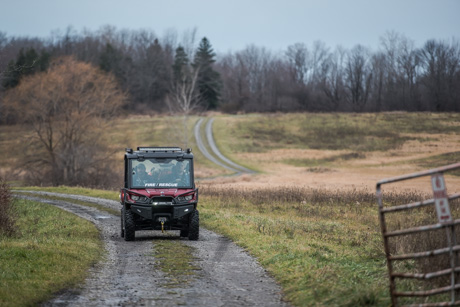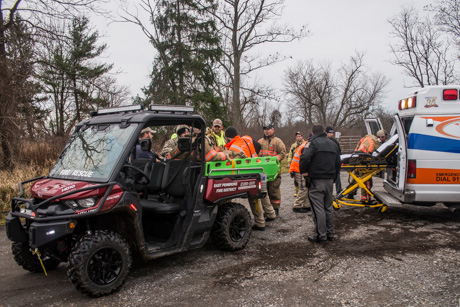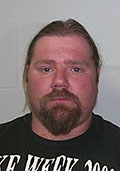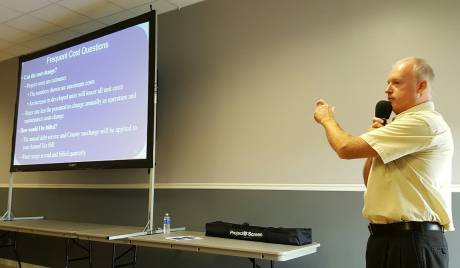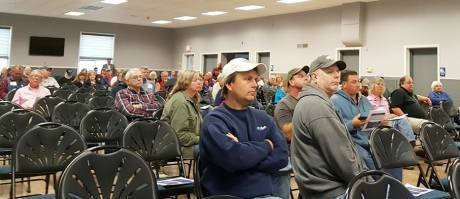If an informal show of hands lines up with the results of a post card survey of residents and the Darien Town Board holds true to its pledge of neutrality, then it looks as though a proposed $24.8 million project to supply public water to two-thirds of the population in the Town of Darien will not come to fruition.
About 40 of the estimated 65 people who attended an informational meeting this morning (and into the early afternoon) at the Darien Fire Hall lifted their hands in opposition, while only 10 indicated they were for the proposal, which estimates show would cost property owners, at the outset, $1,275 annually in debt service and water usage costs.
At a similar meeting attended by about 230 people on Wednesday night, Town Supervisor David Hagelberger said the show of hands indicated a 60 percent against, 40 percent in favor outcome.
Hagelberger said that the current opportunity to get public water to the 2,095 town residents who have well water is probably a "go or no go" situation.
"We've been working for 10 years at this, and today we're at a point where it is much less expensive than any of the previous alternatives," Hagelberger said. "If this doesn't go through ... it could be another 20 to 30 years."
The supervisor said the board has been working with the Monroe County Water Authority for the water supply and the USDA Rural Development to get funding for what would be called Town of Darien Water District No. 6, noting that the USDA's approval of a $6.8 million grant is necessary to bring the costs to an affordable level.
He also stressed that the board wants to carry out the wishes of its residents.
"This is an issue of whether you want this to go forward or not," he said. "People have asked us over the past couple years to get water, and we've spent a lot of effort and a lot of time to get to that point. Now, we're in line for funding, but it only works if you want it."
The board contracted wilth Steve Mountain, of Mountain Engineering, to gather pertinent cost, funding and water supply data to present to property owners in order for them to make an informed decision.
Mountain (in top photo) shared for about an hour from a PowerPoint presentation, reinforcing Hagelberger's view that now is an opportune time to create the water district because of low interest rates (currently 2.25 percent on an $18 million loan paid over 38 years), an abundant supply of water (coming from Lake Erie and administered by Monroe County), and the willingness of USDA Rural Development to offer the grant.
The projected $1,275 annual cost to the typical household to be served is broken into two parts -- $914 for the project debt distribution ($712,850 per year divided by 780 household units) and $361 for water supply and operations and maintenance cost based on current water rates. Mountain said the figure could go down, depending upon an increase in the number of units or additional grants, or up as water rates increase.
Darien residents would pay slightly more than those in recently formed water districts in Stafford, Pavilion, Oakfield and the Town of Batavia due to the need to build two water towers and a pump station.
"The topography in Darien and having to build the pump stations drives up the cost," he said.
He also informed residents that costs of the initial connection, such as meter charges, account setup fees, service lines to the residence, and well abandonment and/or separation fees, would be at least $2,000.
Businesses would be treated in the same manner as homes in computing costs, while farms would be given special consideration when it comes to usage, Mountain said.
Questions from the residents primarily dealt with costs, with some worried that the expense would ulitimately be higher than anticipated.
Tim Hack, who moved with his family to the town last year from Kenmore, said his taxes went up by $1,000 this year and he could see them increasing to $7,000 or more should this go through.
"We have a well with a filtration system, and the water is good," Hack said. "If I want taxes this high, I could live in Clarence Center, Williamsville or Amherst. And how can you guarantee that the $914 won't go up, with delays, cost increases in materials and the bidding process?"
Mountain responded by saying that the $914 is a fixed price -- "If it goes higher than that, then the project stops," he added -- and that contingencies have been included in the project budget.
Mammot Road neighbors Darrin Wojna and Dan Janis agreed wilth Hack.
"Taxes are high enough and there is nothing wrong with the well water," Wojna said.
"When I moved out here my taxes were $1,800. Now they're up to six grand," Janis said. "Now they want to tack on $1,275 a year in taxes plus two grand to hook into it?"
Tony Mateszewski, who moved back to the town after a 30-year absence, said he calculated the cost over 38 years at $50,000.
"I can put in several deep wells for $50,000," he said. "And what about maintenance fees and inspection of my well? I have a perfectly good well and I don't need Erie County water."
The Goodmans -- Eric and Trina -- questioned the town board's process of paying for engineering and other services before coming to the residents, and also the sending post cards (requesting a yes or no vote) to property owners. Hagelberger responded by saying the board needed to get cost estimates because "you would have asked us 'how much does it cost?' " and will validate all post cards returned to the town clerk.
Trina Goodman said she believes the board is leaning toward passage of the proposal, and said she will go "house to house" to find out what residents really want.
Again, Hagelberger said the board has no preference.
"If you have a preconceived notion that the board is in favor of this, then if so, why are we spending all this time and are here today?" he asked in reply.
In the end, tabulations from the 868 post cards that were mailed out will give the board clear direction. At least, that's what Hagelberger is hoping for.
"The last thing we want is a 50-50 split," he said. "We're doing this for the residents. We're not doing this to the residents. We're looking for a majority, (understanding) that some people are going to be unhappy no matter what."
Mountain said should the district be formed -- after either legal petitions by property owners or a vote of the town board, a public hearing and passage of a resolution -- it would take up to another three years before construction is complete.
